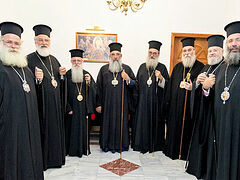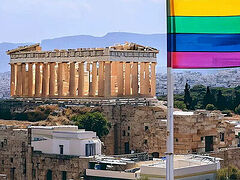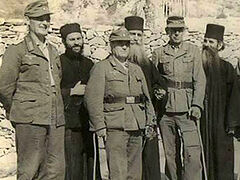Heraklion, Crete, Greece, November 20, 2024
 Photo: orthodoxia-ellhnismos.gr
Photo: orthodoxia-ellhnismos.gr
The Holy Eparchial Synod of the Church of Crete (Patriarchate of Constantinople) convened on Monday, November 18, 2024. During the session, the hierarchs held a lively discussion about the recent visit of German President Frank-Walter Steinmeier to the Greek island.
On October 31, the German head of state went to the village of Kandanos, which was completely destroyed by German troops in June 1941, with the massacre of about 180 inhabitants. On the one hand, he said: “I ask forgiveness from you, the survivors and descendants, for the grave crimes that the Germans committed here,” while on the other hand he stated that Berlin considers the issue of reparations “closed under international law.”
However, for Greece, the issue of reparations is “still very much alive,” according to Prime Minister Kyriakos Mitsotakis.
In the aftermath of the President’s visit, the Crete Holy Synod extensively discussed the executions, horrific destructions, violence, and looting, including of places of Divine worship, by Nazi Germans throughout Crete.
-
Particularly congratulate His Eminence Metropolitan Amphilochios of Kissamos and Selino for what he courageously and politely said about the Nazi occupation in Crete to the German President during his visit to martyred Kandanos on October 31, 2024 [see below].
-
Contact specialist to create a Memorial Center for the complete recording and unified collection of names of those sacrificed, both clergy and laity, throughout Greece and especially in Crete, and to compile a “code of sacrifices” of the German occupation in the Great Island.
-
Create a catalog of sacrificed clergy and monks in Greece and especially in Crete during the German occupation, hold a Synodal memorial service for them, and construct a special plaque with the names of executed and killed clergy and monks of the Church of Crete from the Nazi German occupation, to be placed in a suitable location around the Holy Metropolitan Church of St. Minas in Heraklion-St. Catherine’s Square.
-
Hold Synodal memorial services in Crete at locations designated by the state as martyred settlements due to Nazi German atrocities.
-
Publish a special volume of the Holy Synod’s journal in memory of those sacrificed during the German occupation.
-
Request from competent authorities the existing data and progress of German reparations for the Nazi occupation in Greece.
-
Call upon Cretans to maintain a vigilant national consciousness, keep their identity and historical memory alive, and not forget the unsubdued fighters against the horrific German occupation, those who resisted, were bloodied, and suffered terribly for freedom and human dignity.
***
In response to the German President’s assertion that the issue of reparations is closed, Met. Amphilochios of Kissamos delivered a powerful seven-minute address.
He began by highlighting a poignant historical example of Cretan magnanimity: In 1974, then-Metropolitan Irenaeus Galanakis had provided temporary shelter for German soldiers’ remains at a historic monastery until a German cemetery could be established. The Metropolitan used this to contrast the Greek spirit of reconciliation with Germany’s current stance on war reparations.
He then directly challenged the President on two major issues: Germany’s unsupportive role during Greece’s financial crisis (particularly pushing Greece toward the IMF), and the unresolved matter of World War II reparations and the occupation loan [money that Nazi Germany forced Greece to “lend” it when it was occupying the country]. He firmly rejected the German position that these matters are “legally closed,” stating instead that they represent an ongoing “historical responsibility” and “national imperative.”
His speech, which received enthusiastic applause from those present, particularly emphasized that Germany’s acknowledgment of historical responsibility must be translated into concrete action regarding both the occupation loan and war reparations. This was notably the most direct confrontation President Steinmeier faced during his three-day visit to Greece, bringing him face-to-face with the lasting impact of Nazi atrocities in Crete.
Follow OrthoChristian on Twitter, Vkontakte, Telegram, WhatsApp, MeWe, and Gab!



